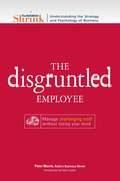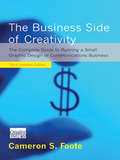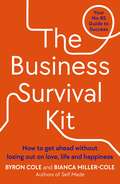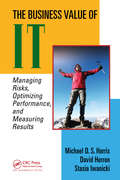- Table View
- List View
The Business Romantic: Fall back in love with your work and your life
by Tim LeberechtTop 10 Motivational Books of 2015 - Inc.comTop 10 Creative Leadership Books of 2015 - ForbesAgainst the backdrop of eroding trust in capitalism, pervasive technology, big data, and the desire to quantify all of our behaviours, The Business Romantic makes a compelling case that we must meld the pursuit of success and achievement with romance if we want to create an economy that serves our entire selves.A rising star in data analytics who is in love with the intrinsic beauty of spreadsheets; the mastermind behind a brand built on absence; an Argentinian couple who revolutionize shoelaces; the founder of a foodie-oriented start-up that creates intimate conversation spaces; a performance artist who offers fake corporate seminars for real professionals - these are some of the innovators readers will meet in this witty, deeply personal, and rousing journey through the world of Business Romanticism.The Business Romantic not only provides surprising insights into the emotional and social aspects of business but also presents 'Rules of Enchantment' that will help both individuals and organisations construct more meaningful experiences for themselves and others.The Business Romantic offers a radically different view of the good life and outlines how to better meet one's own desires as well as those of customers, employees, and society. It encourages readers to expect more from companies, to give more of themselves, and to fall back in love with their work and their lives.
The Business Rules: Protect Yourself and Your Company From Over 100 Hidden Pitfalls
by Jo HaighThe business world is awash with legal pitfalls and opportunities. If you own or run a small-to-medium sized business (with a turnover of up to 10 million) you cannot afford to miss out on this book. Jo Haigh is a business expert who gives presentations to companies on how they can protect themselves - as individuals and as a group - from a range of potentially fatal pitfalls. In this accessible and practical book, she highlights essential - yet very often unknown - business practice to provide valuable insight and guidelines to alert and arm you before you enter the proverbial lion's den of the business world. The Business Rules draws on current legislation and case histories. It covers approximately 80 key topics, divided into sections: Business structure; Funding; Compliance; People and personal liabilities; Management; Tax and accounting; Exiting
The Business Rules: Protect yourself and your company from over 100 hidden pitfalls
by Jo HaighThe business world is awash with legal pitfalls and opportunities. If you own or run a small-to-medium sized business (with a turnover of up to 10 million) you cannot afford to miss out on this book. Jo Haigh is a business expert who gives presentations to companies on how they can protect themselves - as individuals and as a group - from a range of potentially fatal pitfalls. In this accessible and practical book, she highlights essential - yet very often unknown - business practice to provide valuable insight and guidelines to alert and arm you before you enter the proverbial lion's den of the business world. The Business Rules draws on current legislation and case histories. It covers approximately 80 key topics, divided into sections: Business structure; Funding; Compliance; People and personal liabilities; Management; Tax and accounting; Exiting
The Business School Curriculum Debate: Scientific Legitimacy versus Practical Relevance (Routledge Advances in Management Learning and Education)
by Alexander StyhreWith more than 14,000 business schools worldwide, what is included in their curricula matters for how the economy and the corporate system are managed. Business schools should be subject to scholarly inquiries and critical reflection. While many studies of business schools examine its general role in the tertiary education system and in society more broadly, this volume examines how one specific theoretical perspective and a normative model derived therefrom were developed and gradually appropriated within the business school setting. This volume demonstrates that agency theory, based on a daring conjecture that firms can be construed as bundles of contacts, rose to prominence in the business school context. It examines how the elementary proposition of agency theory, that the firm is to be considered theoretically and practically as a "nexus of contracts," was never consistent with corporate law and contract law, and it was empirically unsubstantiated. Business schools are under pressure to teach not only practically useful theories and models, but also theories that are also scientifically qualified. Despite having this ambition, certain theories are widely taught despite failing to live up to such declared ambitions, which means that business schools may be criticized for including theories on ambiguous grounds in the curricula. This book examines how business schools seek to honour the ambition to teach both scientifically verified theories and practically useful concepts and models, and how the tensions derived from this duality may be problematic to handle. It will be of interest to researchers, academics, and advanced students in the fields of management education, organizational studies, and legal theory.
The Business School in the Twenty-First Century
by Jagdish Sheth Peter Lorange Howard Thomas Howard Thomas Peter LorangeQuestions about the status, identity and legitimacy of business schools in the modern university system continue to stimulate debate amongst deans, educational policy makers and commentators. In this book, three world experts share their critical insights on management education and new business school models in the USA, Europe and Asia, on designing the business school of the future, and how to make it work. They look at how the business school is changing and focus in particular on emergent global challenges and innovations in curricula, professional roles, pedagogy, uses of technology and organisational delineations. Set within the context of a wider discussion about management as a profession, the authors provide a systematic, historical perspective, analysing major trends in business school models, and reviewing a wealth of current literature, to provide an informed and unique perspective that is firmly grounded in practical and experimental analysis.
The Business School of the Future
by Peter LorangeFacing questions about the status and legitimacy of business schools, many of the world's leading institutions are now experimenting with new business models. In The Business School of the Future, former president of International Institute for Management Development (IMD), Peter Lorange reveals how the era of virtual technology, and the shift away from conservatism in classical academic institutions, heralds the arrival of a new kind of accessible and scalable business school. Drawing on his expansive and expert experience as a professor, leader and founder of academic institutions across the US and Europe, Lorange discusses the pedagogical and bureaucratic aspects of education and includes five case studies of institutes practicing the cutting-edge approaches discussed in the book (CEIBS, IMD, Singapore Management University, IE Madrid and Hult). This guide to designing the business school of the future, incorporating industry innovations, will appeal to business school deans, educators, policymakers and commentators.
The Business Shrink - The Disgruntled Employee
by Peter Morris Peter LauferDo your employees plan exit strategies around the water cooler?Are your office hallways filled with nasty gossip?Is your productivity shrinking and your profits dissolving?As a manager, every day you're faced with disgruntled employees. Now Peter Morris, host of the popular radio show "The Business Shrink," draws on his long experience to help you fix these problems.Gleaning tips from experts such as CNN commentator Lou Dobbs and job search guru Martin Yate, Morris shows you how to:Give workers strong, positive feedbackBreak the endless chain of blaming and backstabbingAbolish poor employee performance and boost productivityNip cases of harassment and bullying in the budUsing sample scenarios, workplace quizzes, and actual examples from Morris's show, you'll learn how to create a harmonious workplace and how to turn disgruntled workers into productive, committed employees.
The Business Shrink - The Disgruntled Employee
by Peter Morris Peter LauferDo your employees plan exit strategies around the water cooler?Are your office hallways filled with nasty gossip?Is your productivity shrinking and your profits dissolving?As a manager, every day you're faced with disgruntled employees. Now Peter Morris, host of the popular radio show "The Business Shrink," draws on his long experience to help you fix these problems.Gleaning tips from experts such as CNN commentator Lou Dobbs and job search guru Martin Yate, Morris shows you how to:Give workers strong, positive feedbackBreak the endless chain of blaming and backstabbingAbolish poor employee performance and boost productivityNip cases of harassment and bullying in the budUsing sample scenarios, workplace quizzes, and actual examples from Morris's show, you'll learn how to create a harmonious workplace and how to turn disgruntled workers into productive, committed employees.
The Business Shrink - The Disgruntled Employee: Manage Challenging Staff Without Losing Your Mind
by Peter MorrisDo your employees plan exit strategies around the water cooler?Are your office hallways filled with nasty gossip?Is your productivity shrinking and your profits dissolving?As a manager, every day you're faced with disgruntled employees. Now Peter Morris, host of the popular radio show "The Business Shrink," draws on his long experience to help you fix these problems.Gleaning tips from experts such as CNN commentator Lou Dobbs and job search guru Martin Yate, Morris shows you how to:Give workers strong, positive feedbackBreak the endless chain of blaming and backstabbingAbolish poor employee performance and boost productivityNip cases of harassment and bullying in the budUsing sample scenarios, workplace quizzes, and actual examples from Morris's show, you'll learn how to create a harmonious workplace and how to turn disgruntled workers into productive, committed employees.
The Business Side of Agriculture (Routledge Revivals)
by Arthur, G.L. RogersFirst Published in 1906, this book discusses farming in Britain, as well as exploring the business interests and concerns of the farmer whilst debating the future of traditional farming methods.
The Business Side of Creativity: The Complete Guide To Running A Small Graphics Design Or Communications Business (Norton Books For Architects And Designers Ser.)
by Mark Bellerose Cameron S. FooteHailed by one reviewer as the creative business "bible," and considered the authoritative book on the subject for over ten years, The Business Side of Creativity is back, updated and revised to include even more invaluable facts, tips, strategies, and advice for beginning creatives. Every year the market for creative services expands, but the competition is increasing even faster. Today, success hinges not on talent alone, but on a thorough understanding of the business side of creativity. The Business Side of Creativity is the most comprehensive business companion available to freelance graphic designers, art directors, illustrators, copywriters, and agency or design-shop principals. Cameron S. Foote, a successful entrepreneur and editor of the Creative Business newsletter, guides you step-by-step through the process of being successfully self-employed - from getting launched as a freelancer to running a multiperson shop to retiring comfortably, and everything in between. Sample business forms and documents to help put the information into practice are included in the appendixes, and are available for downloading at www.creativebusiness.com/bizbook.html. How should you organize? What should you charge? What marketing techniques yield the best returns? How do you know when it's right to expand? What are the most effective strategies for managing employees? How can you build salable equity? The Business Side of Creativity delves into these questions and hundreds more and gives you practical, real-world answers and invaluable expert advice.
The Business Side of Learning Design and Technologies: Supporting Organizational Knowledge, Performance, and Change Management
by Shahron Williams van RooijThe Business Side of Learning Design and Technologies provides actionable tools and techniques for recognizing the impact of learning design/technology decisions at the project, business unit, and organizational levels. With a focus on aligning learning initiatives with organizational objectives, the book equips early- and mid-career learning designers with essential skills in applying business strategy, artificial intelligence, data analytics, and change management to the selection, design, implementation, and evaluation of learning opportunities. This thoroughly revised second edition further emphasizes the designer as change agent, addresses the rise of remote and hybrid workplaces, adds fresh perspectives on automated and generative systems, and updates its resources, references, and interviews. Grounded in scholarly and practitioner research, systematic literature reviews, interviews with learning and development thought leaders, and real-world experience, this book provides actionable strategies for career advancement in a dynamic labor market.
The Business Skills Collection: 30 Minute Reads
by Nicholas BateIntroducing the 30 minute reads e-book series! You're half an hour away from a pain free working life! So why not fill your down-time with some up-skilling? The average commute to work is 30 minutes. Why not kick start your New Year good intentions by using your commuting time to skill-up?! And with five books in the series you could have the most productive week of your life!Digitally native content optimized to be read on-screen Each book contains 10 short, sharp and to-the-point chapters, finishing with an 'Action Plan' with clear, super-structured, super-easy steps to no more pain!Brand new series of short form e-booksEach can be read in just 30 minutes!Covering core business skills and problems to make your work life more productive, less painful and more successful
The Business Solution to Poverty: Designing Products and Services for Three Billion New Customers
by Mal Warwick Paul PolakRight now the number of people living on $2 a day or less is more than the entire population of the world in 1950. These 2.7 billion people are not just the world’s greatest challenge—they represent an extraordinary market opportunity. By learning how to serve them ethically and effectively, businesses can earn handsome profits while helping to solve one of the world’s most intractable problems. The key is what Paul Polak and Mal Warwick call Zero-Based Design: starting from scratch to create innovative products and services tailored for the very poor, armed with a thorough understanding of what they really want and need and driven by what they call “the ruthless pursuit of affordability.”Polak has been doing this work for years, and Warwick has extensive experience in both business and philanthropy. Together, they show how their design principles and vision can enable unapologetic capitalists to supply the very poor with clean drinking water, electricity, irrigation, housing, education, healthcare, and other necessities at a fraction of the usual cost and at profit margins attractive to investors. Promising governmental and philanthropic efforts to end poverty have not reached scale because they lack the incentives of the market to attract massive resources. This book opens an extraordinary opportunity for nimble entrepreneurs, investors, and corporate executives that will result not only in vibrant, growing businesses but also a better life for the world’s poorest people.
The Business Student's Guide to Study and Employability
by Peter MorganWritten in response to the pressures on universities to produce highly skilled and work-ready graduates and intended to map across a three year business course, this book contains the study and employability skills students need to succeed as a business student and graduate, from essential study, presentation and leadership skills to practical advice on getting that all-important job after university. Hands-on learning aids offer exercises for group work and self-study. Readers can expect the book to: Help them adapt to a new culture and environment by setting out what is expected and what they can expect at university Help them bridge the gap between school and university by developing essential study skills such as critical thinking and time management Help them develop transferable skills that are sought after by employers including presentation skills, leadership skills and commercial awareness Give them practical advice on getting that all-important job after university with chapters on CV writing, job hunting, interviewing and networking, among others The book is full of examples drawing on the author’s own personal experience with the final chapter offering words of advice from current graduates and employees working in lots of different sectors all over the world – including US, Europe, China and the UK. The book is complemented by a companion website featuring a range of tools and resources for lecturers and students, including an instructor manual and PowerPoint slides, answers and guidance on skills assessment tasks, templates and examples to download as well as additional chapter content on topics such as plagarism and essay writing. Suitable for all students taking a business degree.
The Business Student's Guide to Study and Employability
by Peter MorganWritten in response to the pressures on universities to produce highly skilled and work-ready graduates and intended to map across a three year business course, this book contains the study and employability skills students need to succeed as a business student and graduate, from essential study, presentation and leadership skills to practical advice on getting that all-important job after university. Hands-on learning aids offer exercises for group work and self-study. Readers can expect the book to: Help them adapt to a new culture and environment by setting out what is expected and what they can expect at university Help them bridge the gap between school and university by developing essential study skills such as critical thinking and time management Help them develop transferable skills that are sought after by employers including presentation skills, leadership skills and commercial awareness Give them practical advice on getting that all-important job after university with chapters on CV writing, job hunting, interviewing and networking, among others The book is full of examples drawing on the author’s own personal experience with the final chapter offering words of advice from current graduates and employees working in lots of different sectors all over the world – including US, Europe, China and the UK. The book is complemented by a companion website featuring a range of tools and resources for lecturers and students, including an instructor manual and PowerPoint slides, answers and guidance on skills assessment tasks, templates and examples to download as well as additional chapter content on topics such as plagarism and essay writing. Suitable for all students taking a business degree.
The Business Student's Guide to Sustainable Management: Principles and Practice (The Principles for Responsible Management Education Series)
by Petra Molthan-HillThe Business Student’s Guide to Sustainable Management has become a core textbook for business undergraduates. With a full introduction to sustainable management, the textbook covers all subject areas relevant to business students. This second edition features fully updated chapters on how to integrate the Sustainable Development Goals into accounting, marketing, HR and other subjects in management and business studies. Furthermore, this second edition offers brand new chapters on how to teach the Principles for Responsible Management Education (PRME) in any business discipline, how to explore new business models designed to support sustainable development and how to crowdsource for sustainable solutions. The book contains over 40 ready-made seminars/short workshops which enable teachers and students to integrate the Sustainable Development Goals (SDGs) into every discipline in business, including economics, operations, marketing, HR, and financial reporting. Each chapter follows the same easy-to-use format. The Business Student’s Guide to Sustainable Management provides a true treasure chest of materials to support staff wanting to integrate sustainability into their teaching and provides support to effectively embed sustainability in the curriculum. The chapters also offer a starting point in developing teaching units for Masters and MBA students. The material is not just useful to people in business schools, but to those involved in wider scale curriculum change, and those looking to make links between different disciplines (for example, how to teach system thinking, corporate peace-making and the crowdsourcing of sustainable solutions). Online Teaching Notes to accompany each chapter are available on request with the purchase of the book.
The Business Student′s Guide to Study and Employability
by Peter MorganWritten in response to the pressures on universities to produce highly skilled and work-ready graduates and intended to map across a three-year business course, this book covers essential skills, from study, presentation and leadership to practical advice on securing that all-important job after university. A number of hands-on learning aids feature throughout, including: Skills self-assessment tables, ′For You to Do′, Integration and Application, Interview questions. This second edition has been thoroughly updated, and is complemented by a companion website featuring a range of tools and resources for lecturers and students, including an Instructor’s Manual and PowerPoint slides, answers and guidance on skills assessment tasks, templates and examples to download as well as additional online chapters on topics such as testing, assessment and alternative options for graduates. Suitable for all students taking a business degree.
The Business Student′s Guide to Study and Employability
by Peter MorganWritten in response to the pressures on universities to produce highly skilled and work-ready graduates and intended to map across a three-year business course, this book covers essential skills, from study, presentation and leadership to practical advice on securing that all-important job after university. A number of hands-on learning aids feature throughout, including: Skills self-assessment tables, ′For You to Do′, Integration and Application, Interview questions. This second edition has been thoroughly updated, and is complemented by a companion website featuring a range of tools and resources for lecturers and students, including an Instructor’s Manual and PowerPoint slides, answers and guidance on skills assessment tasks, templates and examples to download as well as additional online chapters on topics such as testing, assessment and alternative options for graduates. Suitable for all students taking a business degree.
The Business Survival Kit: How to get ahead without losing out on love, life and happiness
by Bianca Miller-Cole Byron Cole***SUNDAY TIMES BESTSELLER***With straightforward, heart-felt advice, The Business Survival Kit guides you to a thriving business while nurturing your humanity -- Marie Forleo, #1 NY Times bestselling author of Everything is Figureoutable This book will help you make clearer, smarter, braver decisions in all areas of your life -- Emma Gannon, author of The Multi-Hyphen MethodStarting a business isn't easy. In fact, it can be scary, exhausting and demoralising. When it finally takes off, even though you're fulfilling a lifelong dream, it can be a struggle to keep up with the rest of your life. How can you cope with the inevitable stresses and strains along the way?In The Business Survival Kit, serial entrepreneurs Byron Cole and Bianca Miller-Cole prepare you for the ride of your life. With straight-talking advice and insights from leading experts it will help you answer the fundamental question of whether you can handle being an entrepreneur in the first place and then help you navigate the inevitable ups and many downs that go hand in hand with that decision. Learn how to: *Cope with stress, anxiety and uncertainty*Build your confidence and tackle impostor syndrome *Maintain a healthy work/life balance*Build strong networks and nurture your personal relationships *And stay motivated (even in the midst of failure)
The Business Value of IT: Managing Risks, Optimizing Performance and Measuring Results
by David Herron Michael D. Harris Stasia IwanickiIn order to maximize IT resources and justify IT expenditures, CIO's and other IT managers must be able to identify meaningful metrics and explain them in a way that management can understand. The Business Value of IT: Managing Risks, Optimizing Performance, and Measuring Results solves this problem by providing practical answers to
The Business Value of Software
by Michael D. HarrisIn business, driving value is a key strategy and typically starts at the top of an organization. In today’s digital age, driving software value is also an important, and often overlooked, key strategy. Executives, and the corporate board, need to expect the highest level of business value from the software the organization is developing, buying, and selling. In today’s digital transformation marketplace, it is imperative that organizations start driving business value from software development initiatives. <P><P>For many years, the cost of software development challenged organizations with questions such as: <P><P>How do we allocate software development costs? <P><P>Should these costs be considered an overhead expense? <P><P>Are we getting the most value possible for our investment? <P><P>A fundamental problem has been built into these questions – the focus on cost. In almost every other part of the organization, maximizing profit or, in the case of a not-for-profit, maximizing the funds available, provides a clear focus with metrics to determine success or failure. In theory, simply aligning software spending with the maximizing profit goals should be sufficient to avoid any questions about value for money. Unfortunately, this alignment hasn’t turned out to be so simple, and the questions persist, particularly at the strategic or application portfolio level. <P><P>In this book, Michael D.S. Harris describes how a software business value culture—one where all stakeholders, including technology and business—have a clear understanding of the goals and expected business value from software development. The book shows readers how they can transform software development from a cost or profit center to a business value center. Only a culture of software as a value center enables an organization to constantly maximize business value flow through software development. If your organization is starting to ask how it can change software from a cost-center to a value-center, this book is for you.
The Business Wisdom of Steve Jobs: 250 Quotes from the Innovator Who Changed the World
by Alan Ken ThomasSteve Jobs, CEO of Apple Inc., was truly one of this generation's most innovative and forward-thinking entrepreneurs. Apple, under his vision and direction, changed the way people interact with each other and think about technology. Known as much for his genius as his privacy, the advice and knowledge he did share with the world gives exclusive insight into the most important man of the past century. "Your time is limited, so don't waste it living someone else's life. Don't be trapped by dogma-which is living with the results of other people's thinking." "We have always been shameless about stealing great ideas." "The cure for Apple is not cost-cutting. The cure for Apple is to innovate its way out of its current predicament." "Remembering that I'll be dead soon is the most important tool I've ever encountered to help me make the big choices in life. Because almost everything-all external expectations, all pride, all fear of embarrassment or failure-these things just fall away in the face of death, leaving only what is truly important."
The Business Writer's Handbook (10th Edition)
by Gerald J. Alred Charles T. Brusaw Walter E. OliuNow in its tenth edition, this classic book remains the complete business-writing reference for students and professionals alike. Alphabetically organized and easy-to-use, its nearly 400 entries provide guidance for writing all the most common types of business documents and correspondence, from brochures, press releases, and resumes, to executive summaries, proposals, and reports. Abundant, real-world sample documents and visuals throughout the book demonstrate effective business communication, reflecting current practices for formatting documents and using email. In addition, advice for organizing, researching, writing, and revising complements thorough treatment of grammar, usage, style, and punctuation to provide comprehensive help with writing skills. Up-to-date coverage of workplace technology gives users the latest advice on writing for the Web, designing Web pages, conducting Internet research, using software tools, and working with electronic documents. This edition has been thoroughly revised to include expanded coverage of audience and context and reflects the impact that e-mail and technology have had on workplace communication. Comprehensive yet concise, The Business Writer's Handbookremains the quick reference faithful users have come to appreciate.
The Business Writer’s Companion, 8th Edition
by Gerald J. Alred Charles T. Brusaw Walter E. OliuThe Business Writer's Companion is the best guide to the business writing essentials that help students land, navigate, and stand out on the job. Affordable and concise, it’s a comprehensive reference that covers the writing process and features more than 60 real-world sample documents. The seventh edition retains the book's intuitive, easy-to-use organization while adding new coverage of social media, and new e-Pages take advantage of what the Web can do with useful digital tips and sample documents. Anticipating the needs of today’s business writers, this is a reference with real-world value, usefully building skills that students carry into their professional careers.



















